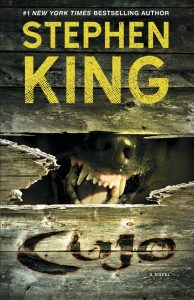A Rabid Dog. A Trapped Mother.
Author: Stephen King
It’s pointless to summarize the story of Cujo – we all know it after all. A woman and her toddler son get stuck in a car out in the middle of nowhere, a rabid dog waiting outside to end their lives. It’s a claustrophobic story of real horror, a tragedy that bears weight because it could happen. But there is so much more to it, a feral sort of magic that takes it beyond reading and makes it into an experience that is both horrifying and oddly beautiful.
Donna and Vic Trenton have a seemingly normal life. A happy one. It has problems though. Their toddler son is convinced that there is a monster in his closet. Donna’s Pinto is acting up again. Worst of all, Vic might lose his job. But they have each other, right? Except on a deeper level there are resentments and things left unsaid. Donna is having an affair, and her newly scorned lover has decided it’s time to call her out for it in the worst possible way.
 Meanwhile, Joe Camber and his family live on the outskirts of town. This is another fraught relationship, an abusive husband and a wife who wants to ensure that her young son doesn’t turn into his father. She is willing to do anything, ignore anything, play any kind of trick to save her child from becoming his father. And all this time the friendly and sweet family dog, the gentle giant Cujo, is nursing a wound on his nose, the result of a failed hunt.
Meanwhile, Joe Camber and his family live on the outskirts of town. This is another fraught relationship, an abusive husband and a wife who wants to ensure that her young son doesn’t turn into his father. She is willing to do anything, ignore anything, play any kind of trick to save her child from becoming his father. And all this time the friendly and sweet family dog, the gentle giant Cujo, is nursing a wound on his nose, the result of a failed hunt.
By the time Donna and her son Tad end up trapped in the Pinto, alone and at the mercy of a rabid dog, the story has evolved to become more than just a cautionary tale or a sensationalistic what-if. It’s about human relationships, about being a parent, about looking back and recognizing the key moments in life that just went by. King melds this insight with the horror of the situation, making it emotional and ultimately poignant. This humanity also takes Cujo beyond the realms of a story into something that is darkly atmospheric. You don’t read this story; you enter its hot, dusty, desperate, longing world. This isn’t just for the humans in the tale either. Brief glimpses into Cujo’s fevered mind bring out the horror of the disease, the sheer injustice and pain of it. The story ends with a lot of death, but there is an irrefutable sympathy with the “villain” of the piece who, ravaged by disease, becomes what he never wanted to be – something that is distinctly not “a good dog.”
 Only King can take a story like this, take a situation so horrific, and make it beautiful in an odd way. Part of this is the sheer atmosphere. The first time I read this book (and yes, this is one of the few books I have read multiple times) felt like a fever dream, the daily world pulling back as I stepped into this story, these feelings. I remember driving down dark country roads, home from work, looking for the flick of animal eyes, oddly scared by a story that just seemed too real. While there are faint supernatural elements that function more as foreshadowing, perhaps even a warning, this particular King tale is all about the realism. In the end, it leaves the reader saddened, but more introspective. You certainly won’t ever try to limp your ailing car down a dusty country road, and you might just hold those near you closer instead of becoming trapped and distracted by the ordinary ups and downs of life.
Only King can take a story like this, take a situation so horrific, and make it beautiful in an odd way. Part of this is the sheer atmosphere. The first time I read this book (and yes, this is one of the few books I have read multiple times) felt like a fever dream, the daily world pulling back as I stepped into this story, these feelings. I remember driving down dark country roads, home from work, looking for the flick of animal eyes, oddly scared by a story that just seemed too real. While there are faint supernatural elements that function more as foreshadowing, perhaps even a warning, this particular King tale is all about the realism. In the end, it leaves the reader saddened, but more introspective. You certainly won’t ever try to limp your ailing car down a dusty country road, and you might just hold those near you closer instead of becoming trapped and distracted by the ordinary ups and downs of life.
– Frances Carden
Follow my reviews on Twitter at: https://twitter.com/xombie_mistress
Follow my reviews on Facebook at: https://www.facebook.com/FrancesReviews
- Book Vs Movie: The Shining - April 6, 2020
- Thankful For Great Cozy Mysteries - December 13, 2019
- Cozy Mysteries for a Perfect Fall - October 20, 2019


